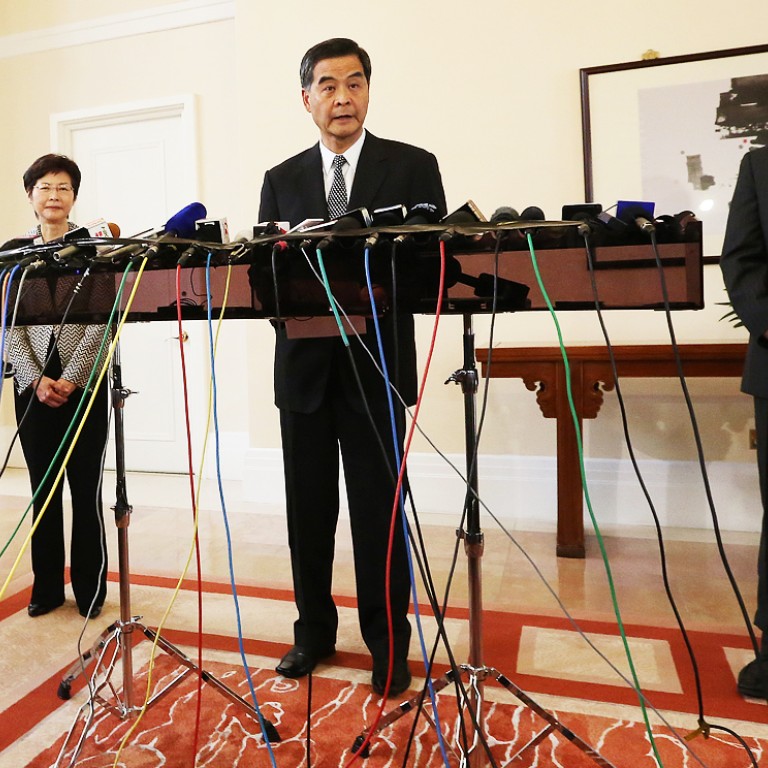
New | Government ready for talks with students in bid to end deadlock, says CY Leung
Leung stresses protesters’ demands will not be met but says he is willing to speak about electoral reform within Beijing’s framework
Negotiations to bring an end to protests that have crippled parts of the city could start next week after Chief Executive Leung Chun-ying said the government is willing to hold talks with student leaders of the pro-democracy movement.
Middlemen have been shuttling messages between the two camps since the government cancelled talks last Thursday when the Federation of Students urged more people to join the mass sit-in to increase pressure for their demands to be met.
Leung said in a press conference this afternoon that he understands students’ demand for an open nomination process for the chief executive election in 2017 but reiterated his stance that the demand could not be met because it does not sit within the framework of the Basic Law and the National People’s Congress’ decision on electoral reform.
However, Leung said the government is willing to speak to students about what can be done within the framework laid down by Beijing. “Politics is the art of the possible,” he said.
Leung said he hopes to make the students understand that Beijing’s decision cannot be retracted. He said he wants to explore with the students what else they can do together within the limit of the Basic Law and the NPC’s decision.
He stressed that the Sino-British Joint Declaration does not contain the words “universal suffrage”. The wording of the declaration, signed in 1984, reads: “The chief executive will be appointed by the Central People’s Government on the basis of the results of elections or consultations to be held locally.”
“The SAR government cannot make civic nomination, which is against the Basic Law, into not against the Basic Law,” Leung said. “We can’t make something illegal into legal. This is not the SAR government that’s saying this. It’s the central government that’s saying this.”
Raymond Tam Chi-yuen, Secretary for Constitutional and Mainland Affairs, said the students’ demand for the government to submit an additional report to Beijing about events in the city over the past few weeks was not constitutionally appropriate, adding that the students should see 2017 as the “beginning of a new chapter” for Hong Kong and be patient in their quest for democracy.
The resumption of dialogue with students is unrelated to any decision to clear the protest areas, Leung said, leaving open the possibility of a clearance beginning while dialogue is ongoing.
“This is very important. We won’t go for clearance because we are talking. And we are not talking because we want to clear,” he said.
Last week, the Federation of Students said occupation would go on while they entered into preparatory talks with the government, which eventually collapsed.
Leung said the government had been hoping to engage students and the stance didn’t change even after the meeting with the federation’s representatives originally scheduled for last Friday was called off.
“This morning we contacted the federation through several middlemen. I hope the federation can give a positive response to the resumption of dialogue,” he said.
Leung said that a university vice-chancellor could chair the dialogue. He added that a one-time negotiation would not be sufficient to bridge political differences, suggesting several round of talks could take place.
Asked whether there was any precondition for meeting, Leung said the objective of the dialogue was to seek consensus on how to implement ”one man, one vote” for the 2017 chief executive election.
Leung said the protests had put “great physical and mental pressure” on police officers and praised the force’s work as “efficient and professional”.
He said there are legal procedures to follow on police officers’ alleged beating of pro-democracy protester Ken Tsang Kin-chiu on Wednesday and said he “absolutely” does not agree with someone “using political means to handle what should be handled with the legal system”.
“I’ve never seen the police being so self-restrained in other societies,” Leung said. “They do not want to incite social conflicts. The long-time, illegal activities are an extremely huge challenge to them.”
Shirley Zhao, Joyce Ng, Gary Cheung
